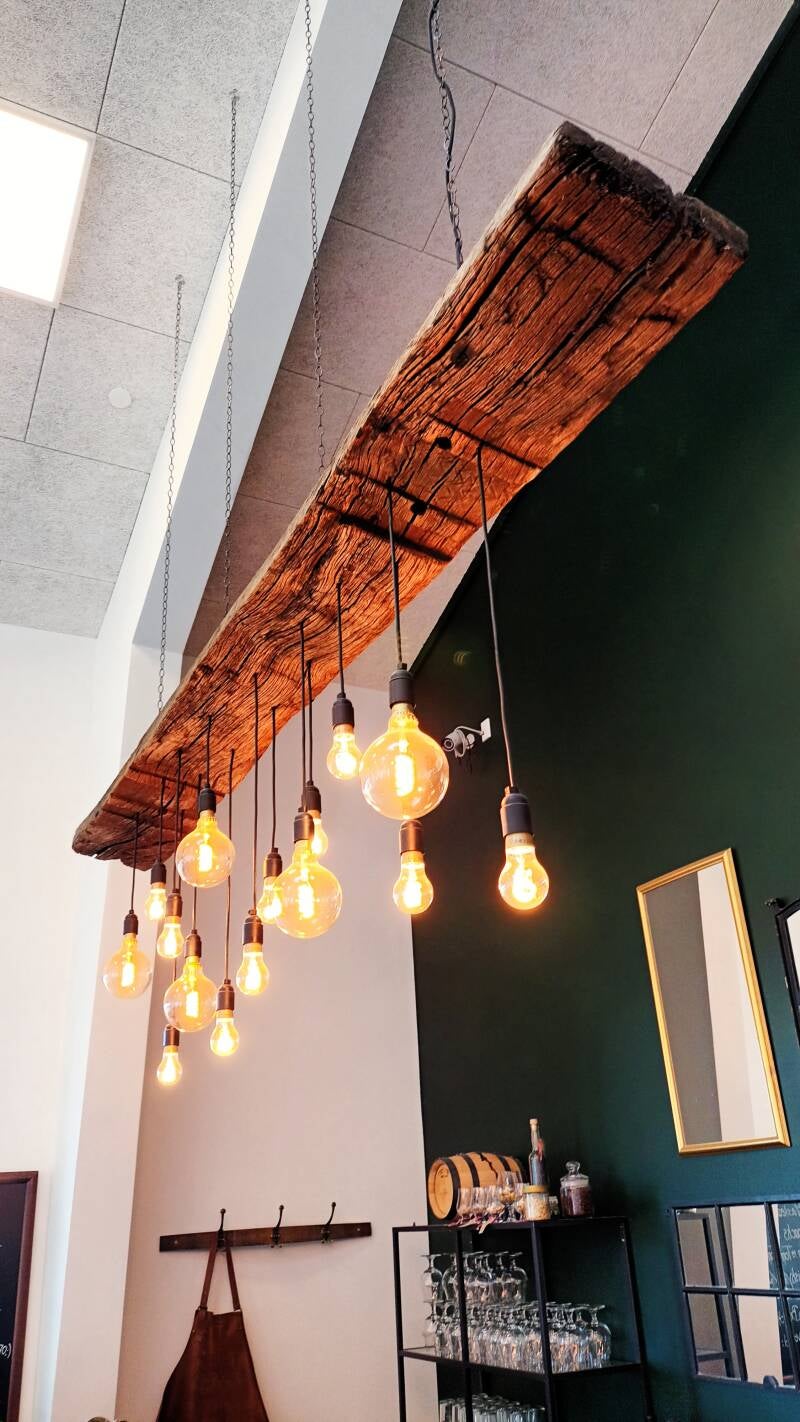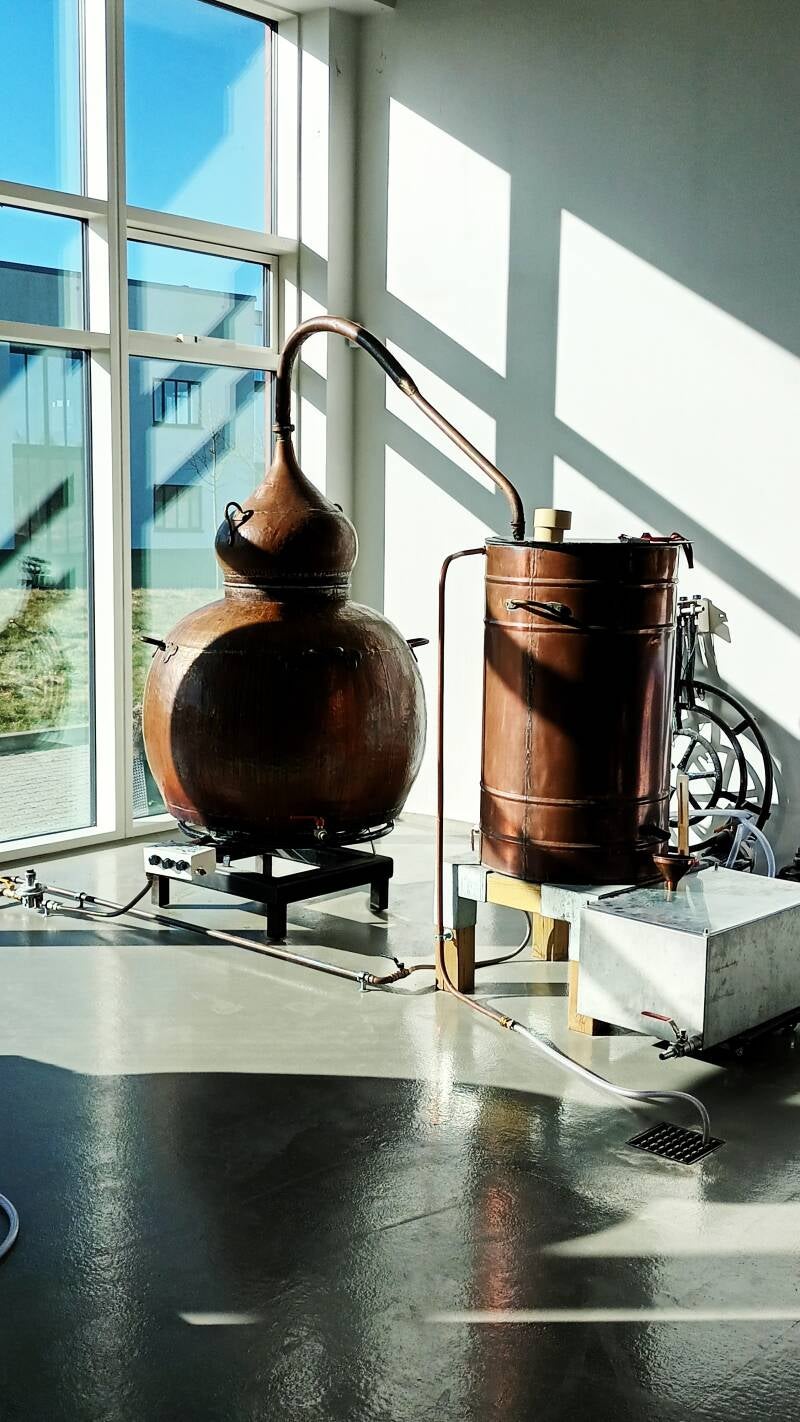Our first Danish distillery, one to watch for the future…
(DK-TRL, no.169)
After recovering from the Whisky Messe in Kolding on Saturday (which was my first ever day visiting Denmark too), I was back in town bright and early Monday morning. This time, I took a bus to the far north end of the town for another first - my first visit to a Danish whisky distillery, Trolden.

Despite being located on the edge of the countryside and an industrial estate, the distillery building immediately struck me as new and easily recognisable. This isn’t a shed with a few stills in the back, but somewhere that is keen to encourage visitors. Daniel showed me around, and explained that Trolden had started as a brewery back in 2005 but relocated here just in time for the pandemic to hit in 2020.
Sadly not a rare story - Brennerei Henrich had a similar problem with their new tasting room!
Thankfully, there are signs of recovery and growth. Daniel explained that they now host 2 tastings every Saturday, combining beer, gin, and whisky. It's a lot of work for the total team of 4 who run Trolden, a distillery whose name *does* refer to trolls but also to a local railway which used to haul coal around this part of Jutland: it was nicknamed ‘Trolden’, and the distillery even incorporated an old railway sleeper in the new space, turning it into this cool lighting fixture!


The small team at Trolden does everything by hand, and their first whisky release was a 4YO bottled in 2015. Daniel stressed that despite investments like this new location, Trolden is firmly a microdistillery. Their claim on every bottle to be ‘one of the world’s smallest distilleries’ is pretty solid when you learn that their potential capacity is only 5,000 litres per year (or ‘LPA’), and they don’t even make that right now.
For scale, the 80,000 beers that Trolden bottle by hand every year equate to 10 minutes of Carlsberg’s production in nearby Fredericia! While their aim is to focus on whisky long term, beer currently takes up a lot of Trolden’s time…


While Trolden are currently limited to a single 700L batch of wash every day, new equipment being installed will soon quadruple that rate of production. They use M1 beer yeast and ferment for 5 days, with IBCs serving as washbacks. Besides one or two 45ppm peated batches for experimentation, all their malt is unpeated pale ale malt from local malters Fuglsang (who are their own success story in recent years). Though dark roast malts arrive from the Belgian Malterie du Chateau for some of Trolden’s dark beers, they haven’t used them for whisky yet…
Trolden double distil using old-fashioned Portuguese copper pot stills made by Barros & Silva. These gas-fired stills look like something from a medieval alchemy workshop, but they work as well as any (and if you look at Stauning’s website, you’ll see there are other Danes using them too…).


Despite their small size (which normally means a lot of copper contact), these stills lead into worm tubs. As any Craigellachie fans/enemies will tell you, that helps make a more oily, meaty spirit. While I wouldn’t say Trolden’s whisky tastes like Craigellachie specifically, you can certainly feel the effect of these condensers and the low reflux of these old fashioned Portuguese alambics.


The warehouse where Trolden house maturing casks has corrugated iron sides, allowing for significant seasonal temperature fluctuations. That said, it's more consistent than their old arrangement, where barrels sat in the hot stillroom (an arrangement we saw last year at Bossche Stokers).
Trolden also has 5 casks sitting in the permanently chilly dungeons of Koldinghus - the castle at the centre of Kolding! First time I’ve heard of castles used to mature whisky…

While some Trolden whisky matures in bourbon hogsheads and wine barriques, most goes into smaller barrels: 64L rebuilt sherry butts. The first barrel Trolden filled in their new location was very fitting - ice wine from Skærsøgaard, one of Denmark’s first two winemakers when licences were first granted in 2001. When Daniel said this was nearby, he wasn’t kidding - Skærsøgaard is within walking distance of Trolden.

Trolden also has a co-operation deal with a mead maker. Trolden distil some of this guy’s mead to produce something more like a Danish “rum”, while he gives them seasoned barrels in turn. I think these are the most interesting casks I’ve heard about in Denmark besides AEro’s Danish oak (which is much harder to get than mead!).



Trolden’s whisky range comes in two parts: the Nimbus series, and the Cumulus series. Everything is single malt and small batch. The Cumulus series are single cask batches of 60 to 90 bottles apiece and released at cask strength. These bottles are for whisky nuts to really get stuck into! With 7 batches so far, you can try Cumulus batches including local barley, virgin oak, PX, Limousin oak… As Daniel put it, 'this is our playground'.
Nimbus Stratus is their signature expression, the consistent counterpart to the experimental Cumulus. This is also ideal for beginners: 46% ABV, a mixture of PX and ex-bourbon casks.


For something only a hair over 5YO, the Nimbus Stratus has a heavy and oily nose. The palate has plenty of spice for 46%, and the PX sends out waves of marmalade and pomegranate. With such rough stills (I say that lovingly), Trolden really must have optimised their process to produce this kind of spirit.
That heavy base could really trick you into thinking this was a Scotch single malt specifically. I’d like to put it next to a Tomatin port cask in a blind tasting and see what happens…
Daniel also let me try Trolden’s new make (at 60% ABV) to compare. Despite the oily weight, this didn’t have the nose-wrinkling of a CS whisky. Sure, it had that sour-milk smell of new make, but the palate was warm and surprisingly pleasant.
Trolden also has some peated Nimbus, which doesn’t actually smell very smoky despite using 45ppm malt. The aromas were more biscuit and hazelnut. The peat gave it spice, but very little rubber or sulphur. It had a more heady sweetness, but lacked the fruit of the unpeated variety.


The Limousin oak Cumulus had strong toffee aromas (Daniel’s tasting note, but I agreed). I would compare this to a Tamdhu 10. The finish wasn’t that heavy despite an ABV of 58%. It had that strong strawberry aroma of classic French oak, but some grape bitterness too. The PX Cumulus had surprisingly little fruit for something that should be very sweet. This was also peated, and heavy notes came through from that: more almond than the blackcurrant you might normally expect.
The Virgin Oak was heavier than a Laphroaig Cairdeas but certainly reminded of it, with a nice plum aftertaste. Conversely, the merlot cask Cumulus is sour and acidic, sharp with very little sweetness. It's drier even than an Amarone cask - as Daniel said, it's not designed to be a crowd pleaser.


The mead cask Cumulus sample I was allowed to try is sadly not for sale - Trolden are still waiting on more to mature. I can’t wait for that, as this had an amazingly light nose dancing around in the glass but a drying palate that closed to a sweet finish. There’s some aroma in there I’ve never had before in a whisky… warm and grainy with the musk of honey. If I had to find a parallel, I’d say there’s some overlap with Dalwhinnie, but this has 10x the character of that malt (sorry Dalwhinnie fans).
We ended with the Anniversary, a 64% ex-bourbon aged expression with only 18 bottles made! This had a real kick - a sweet wall of flavour and a fresh wood aroma. Not fresh wood like the pine smell you get from young whiskies, but a dark hardwood. Daniel suggested teak, and I wouldn’t argue with that.
What does the future look like for Trolden? They’re well set up for visitors, and they have plenty of time for events and visits outside their current Saturday tastings. Kolding is right in the middle of Denmark, accessible by train and with the distillery itself in easy bus or taxi range of the centre. If you’re in the Netherlands, Germany, or Sweden, they can send bottles to you from their online store.
A very small distillery, but with a quality of spirit that speaks volumes. Hopefully, we’ll be hearing from them more in future!


Add comment
Comments